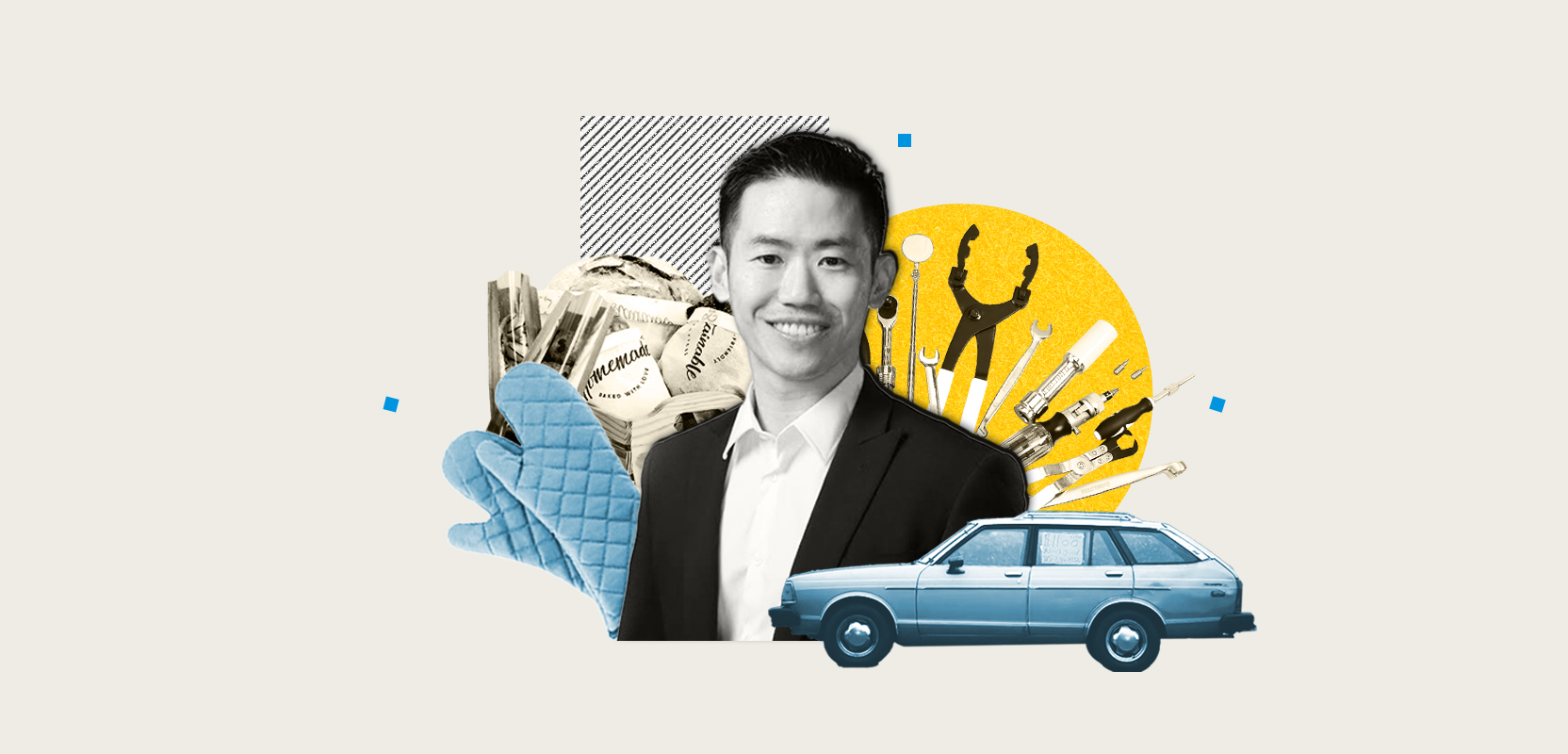
The first time I heard of SideHustles.com was on a phone call with my boss. It was a Monday morning, and just about half of my brain had shown up for work. I was brewing a pot of coffee to entice the other half to come in when a message popped up on my screen.
“Can I talk to you for a minute?”
This is, of course, everyone’s favorite thing to hear from their boss. It’s particularly nice when it’s 10 am and you haven’t done anything that could be described as “work” yet. I fired back a “sure” and rang him up.
The first thing he said—without further preamble—was, “Lawrence just bought a website.” This was delivered in more or less the same tone that I might say “I just bought a bag of potato chips.”
Sorry, I said. What was that?
“Lawrence bought a website over the weekend. We’re going to rebrand it into SideHustles.com. That’s what you’ll be working on for the next year. Oh, yeah—he just bought that domain name, too.”
This came as a bit of a surprise. After all, most people don’t just casually buy whole websites.
But it wasn’t that much of a surprise. The Lawrence in question was Lawrence Ng, the CEO of our company, and he’s done this before. Buying and selling websites used to be his whole business, in fact.
Back in the 2000s, Lawrence founded a company called Oversee.net, a company that traded in domain names. That company is long gone, but as for the man himself, he’s still at it, as the existence of this website proves. It’s one of several in Lawrence’s portfolio.
Who exactly is Lawrence Ng?
How Lawrence got here—and why he chose to start a blog about side hustles—is a story worth telling.
It isn’t a story he’s told often. I sat down with him for what was meant to be a half-hour chat about his past, and when we got up at the end of it, nearly two hours later, he said, “Now you know more about me than most people.”
“Couch surfers, begging for help”
Part of Lawrence’s reticence to talk about himself might be because, bluntly, his past doesn’t sound like it belongs to the CEO of a company. Lawrence Ng grew up poor, and not the kind of poor that means “couldn’t afford the latest video games.” He grew up the kind of poor that means “basically couldn’t afford anything.”
Lawrence was born in Hong Kong, and he immigrated with his mother to New York City at the age of 3. They arrived with nothing, including a place to stay. In Lawrence’s words, they were “couch surfers, begging for help.”
Lawrence stayed with a series of aunts, uncles, and family friends. He told me he couldn’t remember much about their actual living conditions; his memories were mainly of moving. All told, he and his mother relocated 5 times in a 2-year span.
“There was one move where we didn’t even pay for a bus,” he told me, since his mother couldn’t afford the fare. “We just walked with all of our stuff. It was easily two, three miles.”
Even today, some forty years later, Lawrence had more than a little bitterness in his voice when recounting this. He told me he grew up deeply resenting many of the people they stayed with, although he’s on better terms with them now.
“I was in one place, thinking I’m stable, and then—shit—I’m not.”
“You can have that toy when you start making money”
When Lawrence was 5, his living circumstances stabilized, although things still weren’t easy.
In his words, the first lesson he learned from his mom was, “If you want that toy … you can’t have it. You can have it when you start making money. We’re broke now.”
At a staggeringly young age—young enough that he asked me to not print it, since it may have technically violated New York’s child labor laws—Lawrence took his mother up on that, landing a job in a clothing factory owned by a family friend.
“It wasn’t an official job, although I was paid the same rate as the regular workers. They just told me, we’re short of workers on that machine over there, so you need to learn that machine.”
Having never worked in a factory, I wasn’t sure what to picture. What kinds of machines?
“It was everything, man. In hindsight, these were some scary-ass machines.” Lawrence bounced to his feet and began pantomiming the motions required to operate them—machines to stitch buttons, slice fabric, and attach shoulder pads to dresses with a hot iron.
“Those things were hot as hell, not like a regular home iron. If your hand got anywhere near, you were getting burned.”
In contrast to Lawrence’s subdued demeanor when describing his family troubles, he gave no hint that any of this might be a painful subject. He came alive when describing these machines, which he operated at an age when most of his peers weren’t working at all (and the really ambitious ones were running paper routes).
I asked him whether this was a job that he actually wanted, or whether it was something that his mom made him do to chip in.
“No, I wanted to do it. I wanted money. My mom never pushed me to go get a job, it was just … I had no allowance.” His voice shifted, mimicking his mother. “I give you food, you live in my house, and that’s pretty much the deal.”
Anything else he wanted, he had to pay for himself.
It would be nice to write that Lawrence took the money he earned and saved for his future, but that’s not what happened. As he tells it, he spent the better portion of it at the pool hall. He was a confirmed pool addict in school, something that got him into trouble a few years later—but we’re getting ahead of ourselves here.
“Totally mind-numbing”
Lawrence’s gig at the clothing factory wasn’t his only job as a teen. He tried out more than a dozen before he turned 18, including running deliveries for a bakery, working in a high-end Italian restaurant, and even scrounging tennis balls from rooftops to resell. (Speaking of paper routes, he worked one of those too.)
He also held down a second factory job—specifically, at a print factory that churned out magazines. He described this last job as “crappy.”
“It was loud, and you were on this assembly line the whole goddamn day. As the thing was coming through, your job was to just”—he pantomimed operating another machine, complete with sound effects. “Hours of this. Totally mind-numbing.”
Several times, he worked back-to-back day and night shifts.
“There are times when you can fall asleep standing up,” he said. “It is possible.”
“I didn’t know if they were mafia, I didn’t ask”
There were more than a few setbacks. For one thing, Lawrence and his mother kept getting robbed.
At the age of 9, Lawrence arrived home to find that his apartment had been burglarized. His mother’s valuables were missing, items that lived on shelves were strewn everywhere, and the mattresses were flipped over. Even the refrigerator had been ransacked, and its contents now decorated the floor and walls.
The incident wasn’t a one-off. Lawrence took the train to school—largely because he usually missed the bus—and just one year later, he was mugged at the station.
At age 12, it happened yet again, this time by a man who claimed he had a gun.
Both times, Lawrence said, all he had on him was his lunch money, but the sense of violation persisted. Still, he persevered, working more odd jobs to earn back the money he’d lost and then some.
I asked him what his favorite gig was as a teen. He thought for a moment.
“Probably the bakery,” he said.
He went on to describe the work to me. It largely consisted of carrying bags for delivery, not just containing baked goods but also shipments of coffee. Some of these were astoundingly heavy.

“I got ripped.” He laughed. “My friend who worked the job with me, we both got jacked. I think we made forty to fifty bucks in like two and a half hours, which was pretty good, and the owner of the store was like, yeah, eat whatever you want.”
Although it wasn’t his favorite job, he told me he probably learned the most from his stint in an Italian restaurant.
“I liked that for two reasons,” he said. “First, it was a glimpse into repackaging. The actual dining area was beautiful, it had chandeliers and a great style, it was used for post-weddings and concerts and so on, but in the kitchen …” He trailed off. “The vegetables were canned, the sauces were pre-made, but if you put it on a nice plate, it came out looking awesome. That, to me, was kind of like—huh. That’s how life works, maybe.”
The second reason, he said, was that it was aspirational. It gave him a taste of what success might be like.
Lawrence described how some of the customers (“I didn’t know if they were mafia, I didn’t ask”) would occasionally send him to the convenience store and peel off a twenty-dollar bill to tip him with.
“When you’re young, you’re kind of like, who are these guys who can tip twenty bucks? That’s what happens when you make money!”
“I don’t have a single doctor or company owner in my family,” he added. “My aunts and uncles are all super first-gen immigrants, so I didn’t have any white-collar adults in my life growing up.” The Italian restaurant was his first foray into the world of the relatively well-off.
College and early career
In 1996, Lawrence was admitted to Pace University. He kept working, although there was a definite shift in the character of his jobs, with blue-collar work giving way to white-collar work. He landed a job as a law clerk, which he described as “easy.”
Unfortunately, his first semester at college was anything but. Frankly, it was a disaster.

“It was a really rude awakening. I failed two out of my four classes. Another class, I barely passed, and I got fired from my law clerk job.”
Part of the problem was that he’d learned to coast by in high school without putting in real effort, and it took him a while to realize he couldn’t keep doing that in college.
The other part was that there was a pool hall right across the street from his job.
“It was a small little street, too, so it wasn’t even like I had to wait for traffic. Also, there was a bar where my cousin and his friends hung out two blocks away. I got sucked into a lot of stupid stuff.”
All of this—failing and getting fired—happened in just about a month.
“It was like holy shit, what am I doing with my life? Trajectory-wise, this is bad.”
“I didn’t have any good influences, to be honest”
Lawrence took his wake-up call seriously. He leaned on a friend to land another internship to replace the one he’d lost (“That was pure luck,” he said). Then, while still working that job, he landed another—and another.
“On the school front, it was head down, not answering a single call, shutting out all my friends. I didn’t have any good influences, to be honest, so it was phone off, no contact.”
As I write this, I’m looking at a record of Lawrence’s schedule in those days. It’s staggering. He woke up every morning to attend an early class at 7 am. At 9:30, he walked to his first job at Smith Barney, a finance company. At 12:30, it was back to school for more classes—he ate lunch while walking—and then at 3:30, he took the train to another internship at Merrill Lynch. Then he had two night classes.
On Saturday and Sunday, he rested up for the next week.
Just kidding. He had his third job, remember? He worked at Arbour Partners, a small hedge fund.
In his odd moments, he also bought and refurbished cars, which he sold for a profit.
“If you work hard, shit can happen”
Lawrence told me learned several lessons from his jobs in college—and not always the ones you’d expect. There were two moments that made a particularly strong impression on him.
“At Smith Barney, I was the only minority at first in that 30-to-40-person section of the floor,” Lawrence said. “And then in comes an African American. He was very buttoned-up, spoke very eloquently, had just graduated from NYU. Anyway, his first day, he was like, you watch, in less than a year, I’m going to get promoted around here.”
Lawrence laughed.
“He probably observed everybody else and was like, I’m going to rock these people, right? And lo and behold, I saw him get promoted.”
Lawrence described this as when he first realized that he—as a minority from a first-generation immigrant family—could succeed.
“If you work hard, shit can happen,” he said.
The other story Lawrence told was from Arbour Partners. It also contained a kernel of wisdom about the importance of hard work.
“My boss pulled me aside one day and started chatting,” he said. “I asked him about life and how he got to where he was, and he told me, sometimes it’s not about which school you went to or where you started from. He pointed out two people in the office, Carter and—let’s call him Bob—”
Lawrence pointed off into the corner of the room, momentarily conjuring up Carter and Bob (whose names have been changed for this article).
“Look at Carter. He’s way smarter than Bob. He’s sharper, but he’s lazier. He cuts out of here early on Friday and drives to Atlantic City to go gambling. Bob’s not as smart, but his output is way higher. He’s going to progress way further in life than Carter.”
Lawrence told me he left their chat determined to take that lesson to heart.
Oversee.net: a foray into online entrepreneurship
Lawrence’s chance came a few years later. In 1999, after transferring to the University of Southern California and graduating, he went to work for Startpath, a company that ran a digital ad network.
It seemed like the perfect time to start working for an online company. The internet was all anyone was talking about. But just a few months later, the dot-com bubble burst, and Startpath went down, along with hundreds of other businesses.
It was another setback, but also an opportunity. Just a few months after leaving Startpath, Lawrence got to chatting with a former coworker of his, Fred Hsu, and they “had the crazy idea” to get together and start their own business. It ended up being one of the best decisions Lawrence made.
“It was pretty ghetto”
Their new company was called Oversee.net. It was engaged in domain name trading: buying huge numbers of domain names and selling them later for a profit.

The company had modest beginnings. They rented their first office in downtown LA, just off Skid Row.
“It was pretty ghetto,” said Lawrence.
The office itself was in an “old, old building.” The lights were prone to flickering, and “the office just kind of overheated” sometimes. Once, the police set up shop on Lawrence’s floor to scope out targets for a drug sting. Another time, a dead body turned up in the parking lot.
Fortunately, they didn’t stay there long. Oversee.net quickly took off, and within a few years, it was one of the most active domain-trading companies in the US.
I asked Lawrence if he thought there was any connection between its quick success and the considerable work experience he built up in high school and college.
“I do think there are ties. I tell a lot of people this, because a lot of younger folks graduate from college and say, I want to start my own company, and it’s like, really, dude?” Lawrence snorted. “They say, but you did it. And I’m like—no, I had real work experience beforehand. Without that foundation, it’s impossible to learn how a company should operate.”
He cited an understanding of accounting, HR, and sales as being particularly valuable skills from his earlier jobs that he leveraged to make Oversee.net a success. “But also it’s just grit. There are nights when you’ll have to work late, and after the print factory, that’ll be easy. Well—maybe not easy, but not as hard, because at least it’s not as bad as that.”
Whatever the reason, Oversee.net certainly did succeed. In 2007, the New York Times reported that they owned a half-million sites and brought in around $100 million of revenue per year. At the time, Lawrence was 27 years old.
Two years later, he cashed out, selling most of his shares in the company to Oak Hill Capital Partners, a private equity firm, for a cool $24 million.

Later projects and SideHustles.com
What would you do if you earned $24 million before you turned 30?
If you answered “absolutely nothing ever again,” congratulations—you’re normal. Lawrence, however, had other ideas. He took a few years off, but in relatively short order, he dove back into several other projects.
These included the Onramp Fund, a startup incubator, Onramp Lab, a digital marketing company, and the Lawrence C Ng Family Foundation, which Onramp’s About Us page describes as “a grant-making organization dedicated to supporting non-profits helping underprivileged youths through education, mentorship, and career guidance.”
It’s easy to speculate about why Lawrence chose to start a nonprofit in that space. When you know where he comes from, it feels like a logical next chapter in his story.
“There are certain things I’m passionate about, given my background,” he said. “There are just a couple moments in life that are trajectory-changing.”
Again, he mentioned the two experiences he had at his internships in college—meeting his soon-to-be-promoted colleague and chatting with his boss about the value of hard work.
“It’s like the butterfly effect, right? If just those little things could change that much for me, could that happen for other people?”
Lawrence’s next project, apparently, will be SideHustles.com, the website that you’re reading right now. His goal—which, as a writer for the site, I’ll also share—is to turn it into a resource where people can learn about all types of gig work, whether that means driving for Uber, selling crafts on Etsy, or just picking up shifts at a traditional part-time job.
Like his nonprofit, this project feels like it stems naturally from Lawrence’s background. After all, he tried out more side hustles before graduating high school than most people work in their entire lives (although it’s debatable whether something can really be called a side hustle when you’re still too young for a full-time job).
I posed this to him. He agreed that one of his goals was to build the kind of website he’d have found helpful when he was younger.
He went on to say that in his experience, even when a job starts out as a side hustle, it has the potential to become something more.
“It’ll build a foundation for the next thing and the next thing and the next thing,” he said. Making a couple of extra bucks by walking dogs could lead to you opening your own dog-walking company a few months or years down the line, and so on.
One thing he wanted from his new project, he said, was to help other people make these types of transitions.
“It’s better to face it head-on and know where you come from”
My last question for Lawrence was on the personal side.
It struck me that he had one hell of a story—and, arguably, a rather inspiring one. There are a lot of CEOs who’d like people to think they pulled themselves up by their bootstraps, but often, when you take a closer look, their stories collapse; you’ll find that the company they built from the ground up was actually started with a million-dollar loan from a rich relative, or something similar.
By contrast, Lawrence actually came from nothing and worked hard to build a series of successful companies.
Many CEOs wouldn’t be able to stop talking about that. It’s good publicity—the kind of log-cabin-to-White-House story that forms a big part of America’s cultural backdrop.
But Lawrence has never talked about it publicly before. It’s worth noting that this article wasn’t his idea; even after he launched a website called SideHustles.com, I had to beg him to sit for an interview about his childhood and his own history with side hustles.
Why, I asked, have you kept so quiet about this part of your life?
“I think when I was younger, I buried a lot of this emotionally,” he said. “It’s kind of painful, you know? I always suppressed it in my head. It’s not until you get older that you realize it’s better to face it head-on and know where you come from.”
I asked him what it felt like to talk about it now. He thought for a minute and said he hoped his story would serve as an inspiration to people in similar circumstances.
“A lot of people talk to me about how, oh, I come from a very low-income family, so succeeding is impossible for me,” he said. “But they shouldn’t have that thinking.”
Full circle
It’s not much of a leap to hope that Lawrence’s latest project will help some of those same people find success.
Admittedly, it’s always possible to go too far when talking about a company’s mission. While helping people is certainly one of this website’s goals, another is, of course, to make money. That’s how it goes with for-profit sites.
But—and as a writer for SideHustles, I’ll admit to a degree of bias here—I do find a certain satisfying symmetry in Lawrence’s latest project. After several decades and a lot of success in other fields, he’s come full circle and started the kind of website that he could have used when he was just starting out and looking for his first big break.
Written by Robert Jellison.
Related articles
- 30 Best Side Hustles to Earn Extra Money in 2023 – If this inspired you to start a side hustle of your own.
- 15 Side Hustles You Can Do from Home – If you need a side hustle and want to cash in on the trend toward remote work.
- 20 Best Side Hustles for Teens to Make Extra Cash – If you’re a teen who needs to start making money (don’t spend it all at the pool hall).